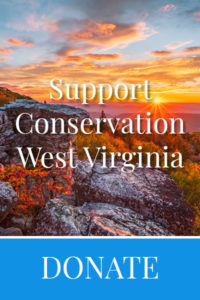West Virginia Legislature Ignores the Environment (Almost)
Every year at this time, those of us interested in environmental preservation and conservation take stock of what the West Virginia Legislature has done for, or to, the environment. Sadly this process usually results in the same conclusion. We made very little progress. During the 2021 regular session just ended, the most notable environmental victory was preventing a harmful bill from passing out of the Senate Judiciary Committee, which was only accomplished after a massive citizen campaign of letters and emails.
The defeated bill was HB 2589, which would have exempted several hundred above-ground chemical storage tanks from the protections of the Above-Ground Storage Tank Act. This Act was passed after the drinking water disaster in 2014 that left 300,000 West Virginians without safe water for weeks. The storage tanks that would have been exempted by HB 2589 were the very type that had leaked before – those within the critical zone just above public drinking water intakes.
In general, this Legislature didn’t do as much legislating of any type as in years past, despite an overwhelming majority enjoyed by the Republican Party in both houses. The Legislature passed fewer bills during the 2021 session than in either of the two previous ones – 21% fewer than in 2020.
The process requires any bill introduced to be referred to a committee in the House or Senate and passed out to the full body only after a discussion and vote. However, only around 25% of bills introduced and referred to committee actually get taken up and considered by that committee. The rest simply die from inaction but may be reintroduced the following year. The decision whether to take up a bill rests with the committee Chair and his decision is guided by the priorities of the Party caucus.
Most of the environmental bills introduced in 2021 died in committee without ever being taken up by the committee Chair. This was the fate of 25 bills I followed, including several introduced by Del. John Doyle (D-Jefferson) that responded to concerns raised by the Rockwool approval process. These included a bill requiring public hearings for all air quality permits and a bill forbidding a manufacturing plant from locating near a public school. Other notable bills that died this way were a bill banning one-use polystyrene food containers and a bill imposing a wildlife impact fee on wind power projects.
Perhaps the two biggest legislative advances for the environment came in the form of bills that were nominally energy-related bills but had an indirect environmental impact. The first of these was HB 3310, which for the first time will permit “purchase power agreements” for solar installations on private property. These agreement allow a third party to build and operate a solar power facility on a customer’s property and sell the power to that customer. The positive effect in West Virginia will be the reduction in demand from coal-fired power plants. But because this kind of arrangement cuts into the revenues of traditional utilities they have been hostile to the concept. Reflecting this, the final bill contains a limit on the total generation loss a utility could suffer from PPAs to 3% of that utility’s aggregate peak customer demand during the previous year.
The second of these two bills was HB 2667, committing the state to reduce the energy consumption in state-owned buildings by 25% below 2020 levels by 2030. To capture the progress in state buildings, each would be benchmarked, measuring that building’s energy use and comparing it to the energy use of similar buildings. The benchmarking process is funded by the U.S. Department of Energy and is already 80% complete. A process for certifying the quality of energy-related contractors for work in state buildings was also a part of the bill.
HB 2667 would save not only energy but taxpayer money. Therein lies the attraction for the nine Republican sponsors of the bill who are usually nowhere near an environmental bill, especially if there is any business opposition. One of these Republican sponsors was Moore Capito, the House Judiciary Committee Chair. The bill also had prominent Democratic sponsors, including the House Minority Leader.
Maybe in all of this there is the outline for success on environmental legislation in future Legislatures. Ensure that our bills involve tax savings or other business-friendly aspects as well as environmental progress. Line up sponsors from both parties. Promote the bills broadly and be ready to put citizen advocates into gear to support them. Of course, each legislature has a different character, with different players and power structures. The political context and hot issues are different for each. But the process of legislating doesn’t change much and surely we can find a way to produce better results for the environment.

